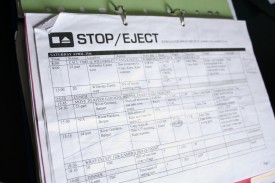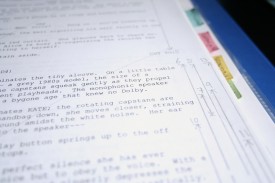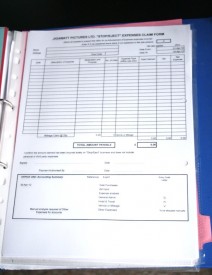A camera operator needs batteries, lenses, cards, filters. A wardrobe supervisor has racks of costumes. A sound recordist carries a dead cat on a stick. But a director needs only his folder. Like Her Majesty’s handbag, the contents of this hallowed portfolio have forever been a mystery. Until now.
Here’s what I kept in my Stop/Eject folder while shooting the film:

The first thing I see on opening the folder is a to-do list. These are all things that need doing the day before the shoot begins, including things that I need to pack in the van for the journey up to Derbyshire.

A copy of the production budget comes next, with highlighted figures like catering and travel being the ones that are still available to spend.

Next up is the schedule, one of several documents I can satisfyingly cross parts off as the shoot progresses. You can download the schedule here.

A list of contact details for the cast, crew, locations and people we’re borrowing props and equipment from.

Then we come to the script. The fact that it’s this far back in the folder tells you how many other things a director who is also co-producing and has no AD has on his mind. Ideally the script and the storyboards would be the only things in my folder. You can see that I’ve drawn tram lines. Normally a script supervisor does this during shooting to indicate which part of the scene a shot covers, but I’ve drawn them in advance to remind me which part of the scene I want each shot to cover.

The largest section of my folder is the storyboards. The ones with the pink highlights are shots I felt would make good production photos, the idea being that we would switch the camera to stills mode after the take and snap a few – but we usually forgot.

Next are the lighting plans for each location. I covered these in detail in my lighting breakdown posts.

Sophie’s concept art is next. Not much use by the time you’re in production, since it’s all been built and dressed already, but nice to look at.

Then comes a wallet of expenses forms for the cast and crew to fill in. This is based on a template from Terry Cartwright’s DIY Accounting package.

Finally, I carry a copy of the public and employer’s liability insurance documents in case any location owners ask to see it.